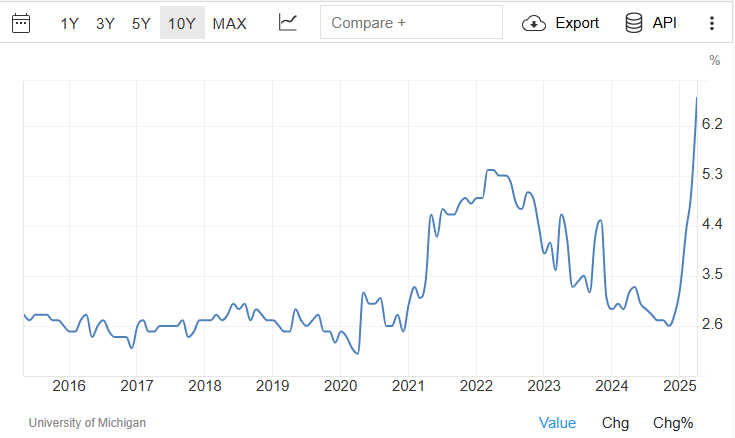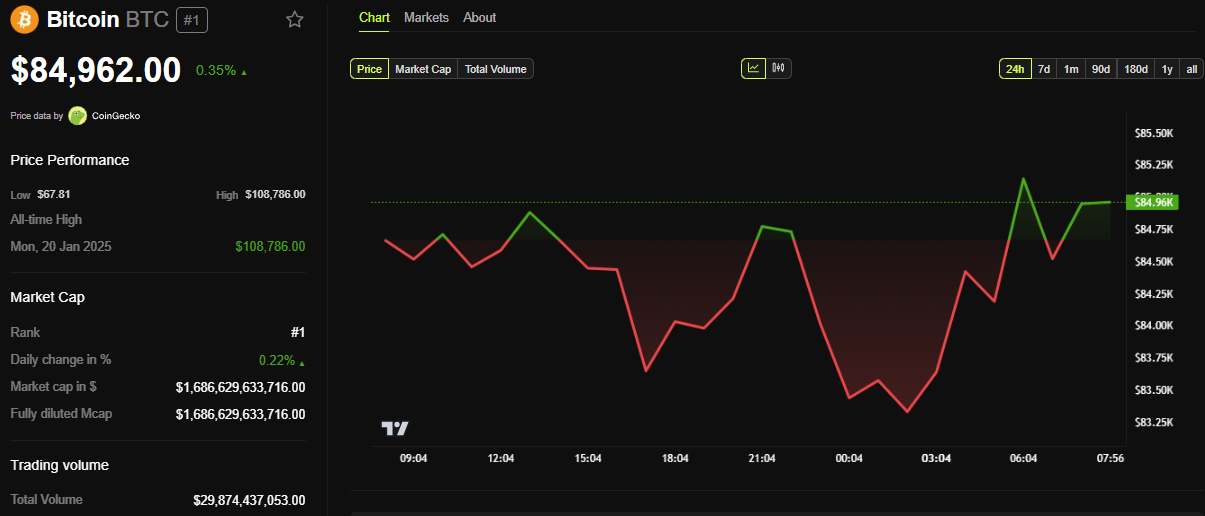As Good Friday holiday approaches, cryptocurrency investors are focusing on four major U.S. economic indicators to be announced this week. These indicators could impact digital asset prices.
From consumer inflation expectations to new unemployment claims, let's explore how they might affect BTC and cryptocurrency prices this week.
Consumer Inflation Expectations
The New York Federal Reserve's March consumer inflation expectations survey, set to be released on Monday, shows how Americans anticipate price changes in the next year.
Recent data indicates that expectations rose from 3% in January to 3.1% in February, signaling growing inflation concerns. Economists' consensus prediction anticipates another increase to 3.3%.
Meanwhile, the University of Michigan consumer survey shows inflation expectations have reached their highest level since 1981.

"Consumer pessimism about future inflation has hit a new peak since 1981. In April, expectations surged from 4.9% to 6.7%. Just three months ago, consumers predicted 3.3% inflation for the next year," a user mentioned.
Along with the rise in U.S. Treasury yields on Friday, market uncertainty amplifies the Fed's dilemma. The Fed's March meeting minutes showed most officials believe inflation could be more persistent, and Trump's tariffs could drive up prices.
This explains the Fed's willingness to continue evaluating economic data before maintaining patience and adjusting policies.
For cryptocurrencies, rising inflation concerns could increase interest in Bitcoin with its fixed supply. However, if expectations become too high, concerns about the Fed's tightening policy could pressure risk assets like cryptocurrencies.
If volatility surges, traders might increase trading volumes in stablecoins like USDT while seeking safe havens. Conversely, lower-than-expected figures could strengthen altcoins and promote risk appetite.
U.S. Retail Sales
The March U.S. Retail Sales report, to be released on Wednesday, measures annual consumer spending and is a crucial economic health indicator. February data showed a slight 1.9% increase to 3.1%, but tariffs and trade tensions could lower March figures.
"Pay attention to the latest inflation data and retail sales figures mid-week. They could determine the Fed's next move," investor George said mentioned.
Strong retail sales typically indicate consumer confidence, potentially boosting stock markets and causing cryptocurrency prices to drop as investors prefer traditional markets. However, weak sales could strengthen recession concerns and move capital to decentralized assets like Bitcoin, Ethereum (ETH), or Solana (SOL).
As the correlation between cryptocurrencies and consumer sentiment increases, Bitcoin often reacts to spending trends. Therefore, volatility is expected this week.
Industrial Production
The Fed's March Industrial Production report, to be released on Wednesday, tracks monthly changes in manufacturing, mining, and utility production.
February's 0.7% decline raised economic slowdown concerns, and economists predicting a 0.2% drop suggest additional decline could signal problems.
For cryptocurrencies, weak industrial production could strengthen decentralized narratives and increase interest in blockchain projects. However, continuous decline might fuel market-wide fear, impacting speculative tokens.
Strong production data could stabilize markets, reducing cryptocurrencies' safe-asset appeal but supporting DeFi platforms linked to real-world assets. Bitcoin miners might face pressure if utility production is low, depending on energy costs.
"In capital-intensive industries like Bitcoin mining, policy stability is crucial. Currently, that stability is lacking." Zaran Mellerud, CEO of HashLabs Mining, recently said.
Traders should monitor leverage in futures markets. Unexpected data could trigger liquidations, especially in smaller coins.
New Unemployment Claims
Thursday's New Unemployment Claims report reflects new unemployment applications and shows labor market health.
Last week's claims increased from 219,000 to 223,000, suggesting slight weakness. A surge in claims could amplify recession concerns, potentially driving funds into Bitcoin. However, altcoins might be impacted by risk aversion.
As Good Friday approaches, reduced liquidity could amplify price movements. Holiday trading volumes are typically low, making prices vulnerable to amplified reactions.

According to BeInCrypto data, Bitcoin is currently trading at $84,962 and has slightly increased by 0.35% over the past 24 hours.






